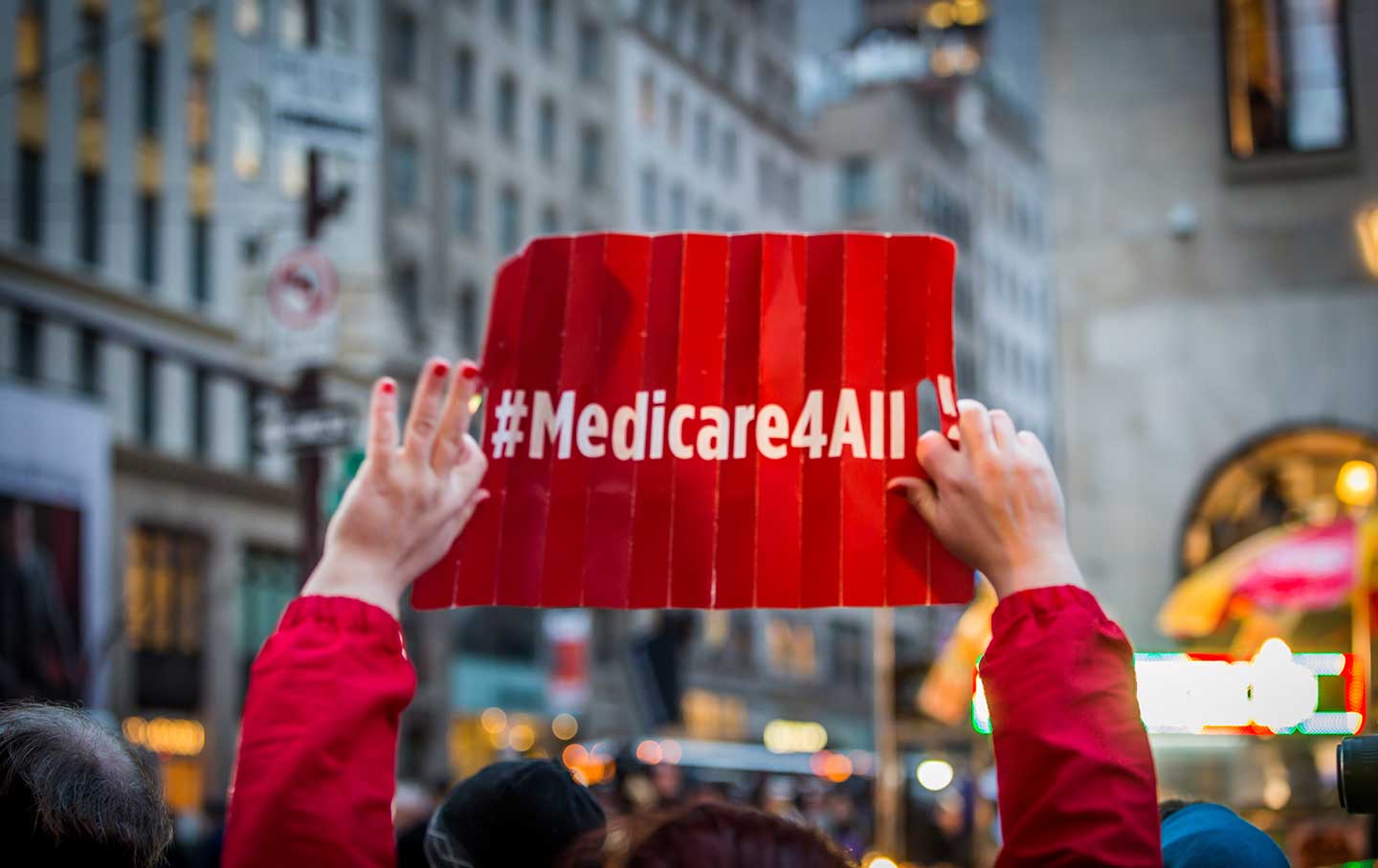
A protest for health-care justice outside New York City’s barricaded Trump Tower in 2017.(AP / Michael Nigro)
We’ve all heard, read and seen the claims that Medicare for All is bad for the the economy, anti-business, and an attack on the free market. In response, advocates for Medicare for All like myself have instead made the case about the moral urgency of ensuring that everyone has health care, no matter their means.
But what if Medicare for All is the moral and economically smart course? What if a business-friendly figure, like an entrepreneur, explained that Medicare for All would be one of the best things we could do to create better paying jobs, faster new business growth, and an economy that could better compete in the world market?
That’s what I’m here to tell you. I’m an entrepreneur and an investor. I’ve helped build companies that have succeeded—I was a founding investor in Blue Apron and the Co-Founder of Aspiration.com, an online financial institution for socially conscious Americans that’s quickly grown to about 1 million customers. But I’ve also been involved in some companies that have failed. A common denominator of all those experiences is that every business I’ve been involved with could hire more and compete better under a Medicare for All health-care system. Not to mention that every worker would have more financial security when their employment isn’t literally a matter of life or death.
Right now, American employers are in the health-care business, whether they like it or not. Each year, US employers spend nearly $880 billion on health-care benefits for their employees. In 2019, the total cost of health care, including out-of-pocket costs for employees and dependents, is estimated to average $14,800 per employee. Health-care costs are a significant and unpredictable problem for businesses, making it difficult to invest and hire new workers.
But it doesn’t just impact employers. The rapid rise in health-care costs in recent decades has also effectively erased much of workers’ gains in real wages. Since 2006, the total cost of health ncare per employee has risen 75 percent, while the median annual salary of a full-time American worker has grown by only 25 percent.
Every other major industrialized economy in the world has a single-payer health-care system where society at large, through taxes, provides health insurance to everyone. In those economies, businesses don’t pay for health insurance, and people don’t worry about losing their health care along with their job, because the two aren’t connected. In those countries, businesses are able to pay higher wages with money that otherwise would have been spent on health-insurance costs, and people are able to live with more freedom to switch jobs, negotiate for higher wages, or start a business.
Consider the effect of employer-provided health insurance on people’s willingness to fight for higher wages. If your employer controls your access to health care, would you be able to harness the courage to demand a higher wage, knowing your employer could fire you and leave you without health insurance? Probably not. But what if your employer didn’t control your health-care access? More often than not, people would be emboldened to ask for higher wages.
Some will argue that ultimately those who work will end up paying for Medicare for All in the form of higher taxes. In fact, 95 percent of all households would save money under a single-payer system, relative to what they pay now in premiums, deductibles, and other out-of-pocket costs.
Now let’s consider entrepreneurship. The American Dream for so many is to start a business, deliver a product or service that people value, and provide good wages for the team that creates it. But that dream is off-limits for so many Americans who fear taking the risk of starting a business for fear that failure could mean losing their access to health care. Imagine how many businesses or inventions haven’t been conceived in America because of people’s dependence on employer-provided health insurance.
Medicare for All will give more people freedom to take the risk of being an entrepreneur by removing the risk that they will lose their health insurance in the process. It would reduce the cost of hiring workers, and lower costs for employers by taking them out of the business of buying and providing health coverage.
It turns out that Medicare for All is the right thing to do for people, and the smart thing to do for our economy. The seven in 10 Americans who support Medicare For All understand that. Now, it’s time for our representatives to listen and act.
Joe SanbergJoe Sanberg is a founding investor in Blue Apron, cofounder of Aspiration.com, and the founder of CalEITC4Me.